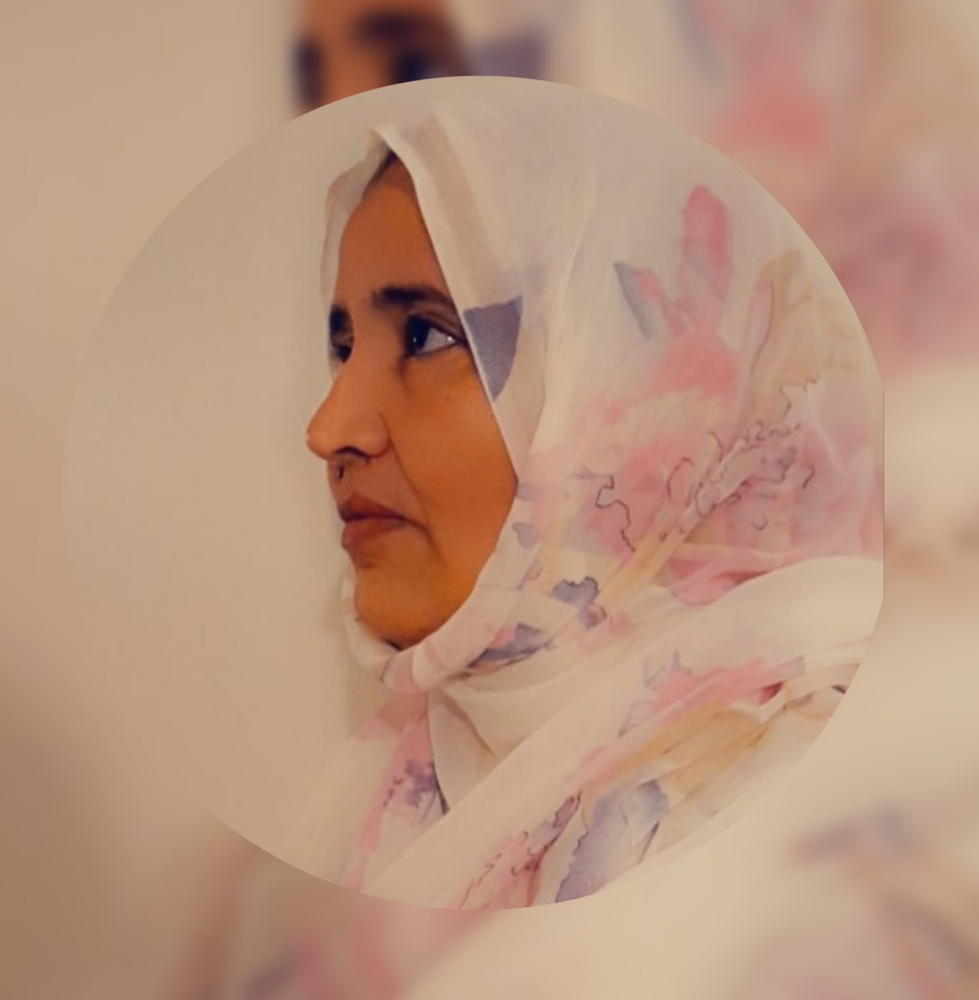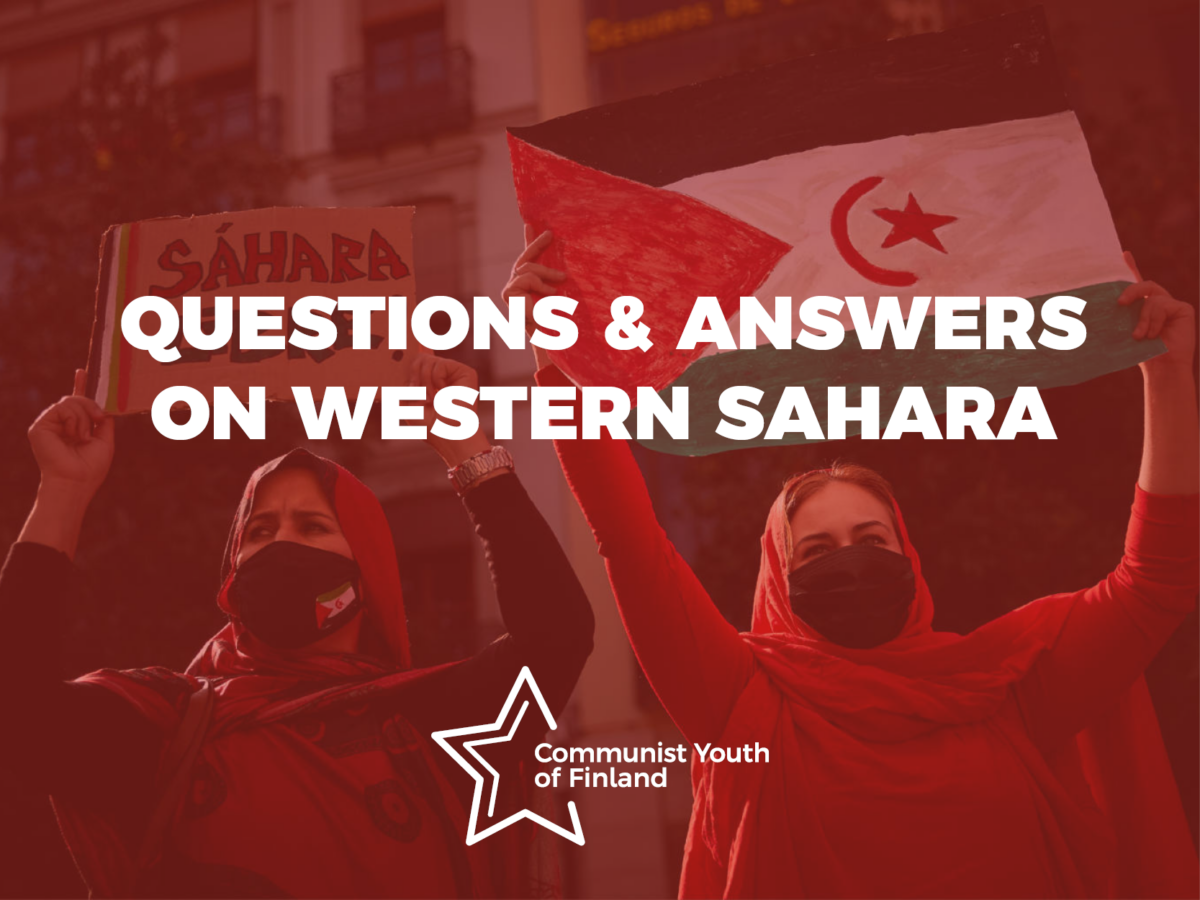This is a Q&A-article in which we’ll try to make Sahrawi Arab Democratic Republic more familiar and answer the most common questions about Western Sahara for people who may be hearing about the Sahrawi people for the first time. Answers have been given by Baida Rahal, Western Sahara’s Liberation Front Polisario’s representative in Finland. For Communist Youth of Finland, the solidarity work for the Sahrawi people of Western Sahara is one of the most important international priorities in our activity.
Q: Does Sahrawi people have the control of the whole Western Sahara?
A: First of all, I would like to say thank you for all the attention.
After the Spanish withdrawal in 1976, Morocco occupied 80% of the territory of Western Sahara. This includes all the coastal strip and important lands where natural resources are concentrated. In this occupied part, there is a majority of the Sahrawi people that reject Moroccan rule, for that they are subjected to repression on a daily basis and also they are deprived of the right to express their opinion, even in a peaceful manner. The Internet is full of information regarding human rights in Western Sahara, especially in Spanish and English.
It is worth noting that Morocco isolates the areas it occupies with a long sand berm filled with types of explosive materials. This wall is known in the North African region as one of the oldest and most well-armed defensive berms.
Q: The United Nations proposed holding a referendum on independence for Western Sahara. How realistic is the possibility of holding a referendum in the future? What must be done to make it possible?
A: The United Nations proposed the referendum as part of the 1996 ceasefire agreement. The Sahrawis accepted opening the way for a peaceful solution under the auspices of the United Nations. In fact, the referendum is a tool for consulting the population, giving them an opportunity to express their opinion freely. But Moroccan obstructed the implementation of the referendum. Why? Because the Moroccan regime knows that the Sahrawis were never part of Moroccan society. This obstruction continued for three decades without reaching any result. Despite the efforts made by the United Nations for this purpose, including the census of the population, for example.
Questioning the reality of the referendum is a Moroccan idea in the first place. The rights of peoples are not forfeited just because of a long period of conflict, or an abnormal situation has passed, such as what happened in Western Sahara. All this does not affect the essence of the right, especially the right to self-determination.
Doubting the reality of the referendum is a way to impose a fait accompli policy on the Sahrawis, and an attempt to legitimize the occupation of Western Sahara, which was carried out using repression and force, in addition to the process of decolonization, which was not carried out in a legal way from the beginning.
The referendum was a possible solution in many conflicts in and out of Africa. However, in the case of Western Sahara, the idea of referendum faced a very difficult reality: It is the absence of any kind of democracy and the right to freedom of expression in Moroccan politics. Herein lies the problem.
Q: Morocco and France has traditionally had close relations. What is the situation today? What kind of international forums exist where people could demand France to end the support of Moroccan occupation?
A: The situation remains the same. By this I mean the same close relations, the same circumstance inherited from the former colonial power that dominates the political scene in North Africa.
But there are forums set up for the free expression of the rights of indigenous peoples in their lands. For example, in the European Parliament, there are a number of sessions devoted to discussing peace in the world. As well as the Human Rights Council in Geneva, where Finland is now an elected member.
In fact, the problem of Western Sahara is a problem that can be discussed in any forum concerned with peace issues, as long as it is democratic. The Sahara issue is one of the challenges facing the international community as it is characterized by sufficient legitimacy and legality. However, all efforts for a solution are obstructed for other reasons that have nothing to do with the values on which the new world was built.
Q: Why does Morocco occupy Western Sahara? Is there any historical connections between Morocco and Western Sahara?
A: The Moroccan occupation of Western Sahara is not based on the existence of any historical ties between the territory and the Kingdom of Morocco. This was proved by the ruling of the Hague Court of 1976.
There are no such links at all. The Moroccan occupation is caused by Morocco’s need for expansion and natural resources. The thesis of common links has been refuted from the outset. Because all North African countries are linked in their Arab origins, as well as religion and language, will Morocco occupy all North African countries due to these ties?
Q: What is the response of countries in European Union to Morocco’s occupation of Western Sahara?
A: The problem of the Moroccan occupation of Western Sahara is not new. Rather, it happened before the founding of the European Union in its current form.
In the past, the positions of European countries varied. In some countries, there is great popular support for the right of the Sahrawi people to self-determination. But at the level of governments, there are other criteria and other conditions. But in general, the Sahrawi issue has supporters in Europe and other parts of the world.
Q: How could you describe Polisario’s political views?
A: The Polisario is an entity that includes the Sahrawis who reject the situation resulting from Spain’s sudden withdrawal, and Morocco’s occupation of Western Sahara by force. All the views of the Polisario are in this perspective. Expressing the thought of the Sahrawis, their different identity, the appropriate form of government for them.
This is exactly the Polisario, which embodies the system of values that the Sahrawi people believe in.
Q: Which are the main political priorities for Polisario administration?
A: The priority is to continue to demand the right of the Sahrawi people to decide. At the same time, continuing to build the capacity of the desert community and providing it with the ability to withstand the journey of struggle to regain its land.
Q: In which international forums or unions does Polisario and Western Sahara work and co-operate?
A: If I understand well here. The Polisario does not have a specific party or political form. Rather, it is a gathering of the Sahrawis, that is, the original inhabitants of Western Sahara, who are struggling for the right to self-determination. Therefore, it deals with all organizations that defend common values such as the right to peace and a decent life.
For example, there was the attendance of some Socialist International forums by the Sahrawi Youth Organization, as well as the Women’s Organization. In some countries, the issue of Western Sahara is a common point between the different parties in their orientation. There are some names that I can’t remember right now. But, for example, we are a member state of the African Union and attend the gatherings of all its forums. For example, African civil society.
Q: What are the good ways to support Sahrawi people’s struggle for freedom and human rights?
A: What a question! Good ways to support the Sahrawi people are determined by how each country’s solidarity policy works. But in a way, there are levels and goals as well. For example, the ultimate goal is to support the efforts of nations to support the proposed peaceful solution for self-determination, and this is the work of governments. But it is a goal that is demanded by all persons, organizations, forums…
But there are other levels of support, for example visiting the Sahrawi refugee camps in southwestern Algeria. Seeing the conditions of people, what they do daily in one of the longest refugee situations in the world.
I think that solidarity, and the images to show it, is a creative act. Anyone can do it according to his capabilities and imagination. Recently I saw videos of people who decided to stand in solidarity with the Sahrawi people by making a bike trip that went through forty countries! Can this be imagined? When we have the will to stand in solidarity, we can visualize the way in which we stand in solidarity according to our many possibilities.
Q: Is there some webpages where could be read more info about Polisario and Western Sahara’s situation from Sahrawi people’s perspective?
A: Naturally. There are pages on the Internet that carry the Sahrawi flag, such as the Sahara Press Service. In Spanish and English. As well as several other sites, for example, there is a site for the Solidarity Committee in Geneva. When we put the name of Western Sahara in Google, there is a lot of information and university studies on the subject.
Even in Finnish there is enough information to serve as a reference.
Thank you for the interview.


